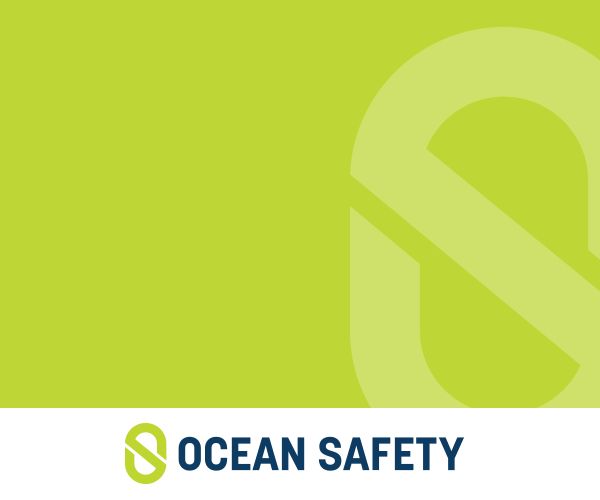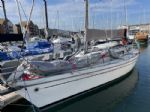

-(1)-202408140552.gif)









Boats for sale
| Rossiter Pintail Mortagne sur Gironde, near Bordeaux |
 |
| Laser 28 - Excellent example of this great design Hamble le rice |
 |
List classes of boat for sale |
Extreme 40 crash decision |
Post Reply 
|
Page <1 56789> |
| Author | ||
gordon 
Really should get out more 
Joined: 07 Sep 04 Online Status: Offline Posts: 1037 |
 Post Options Post Options
 Quote Quote  Reply Reply
 Topic: Extreme 40 crash decision Topic: Extreme 40 crash decisionPosted: 25 Sep 11 at 4:47pm |
|
|
R's option to tack was somewhat limited by the white boat that was following them.
The video evidence seems to make it clear that R took reasonable avoiding action when A passed through head to wind and broke rule 13. A then completed her tack and stalled. A had acquired ROW and did not give R room to keep clear. Having already broken rule 13 A then broke rule 15. Although R MAY have avoided contact by tacking when A passed head to wind, she was under no obligation to do so. When R initially bore away this was a reasonable and seamanlike manoeuvre. It was only when A compounded her initial error by failing to tack smoothly that it became clear that R's initial bear away was not sufficient. At this moment R had already started to bear away and tacking was no longer an option. Attempting to bear away was by then the only seamanlike manoeuvre. I agree that this incident does demonstrate that a boat required to keep clear or give room must allow a considerable space. Gordon |
||
|
Gordon
|
||
 |
||
Skiffman 
Far too distracted from work 

Joined: 27 May 04 Location: United Kingdom Online Status: Offline Posts: 291 |
 Post Options Post Options
 Quote Quote  Reply Reply
 Posted: 25 Sep 11 at 10:47pm Posted: 25 Sep 11 at 10:47pm |
|
|
I think that your position is clear Gordon but my question is could R have made more of an effort to bear away? The mainsheet was not released fully, if it had they would have had no problem ducking. So why was the mainsheet not released fully? Was it because they wanted to keep it on so they could do a good tack or was it because of a malfunction? Which is probably only the guys on R will know.
It will be interesting if this makes it into the case book as there is a lot of room required. More so than I have ever thought or ever seen in 49er racing!
|
||
 |
||
Brass 
Really should get out more 
Joined: 24 Mar 08 Location: Australia Online Status: Offline Posts: 1151 |
 Post Options Post Options
 Quote Quote  Reply Reply
 Posted: 26 Sep 11 at 12:19am Posted: 26 Sep 11 at 12:19am |
|
|
There's no doubt that R could have made 'more of an effort to bear away'. The question is, why should anyone think she was obliged to make 'more of an effort'?
At the time R bore away, she bore away to a course which, had A accelerated out of her tack normally, would have passed astern of A. It was reasonable for R to bear away enough to miss A but no more.
The next observable event was that A did not accelerate normally out of her tack. It was at this point that it became clear to R, that on her new course, A was no longer keeping clear, but now there was insufficient time for R to bear away further, that is, at that time, it was not reasonably possible for R to avoid contact with A in the new circumstances. Thus R did not break rule 14 as limited by rule 14(a).
This situation is not about 'room'. It is a simple rule 13 and rule 14 case. Edited by Brass - 26 Sep 11 at 2:24am |
||
 |
||
rb_stretch 
Really should get out more 
Joined: 23 Aug 10 Online Status: Offline Posts: 742 |
 Post Options Post Options
 Quote Quote  Reply Reply
 Posted: 26 Sep 11 at 2:18pm Posted: 26 Sep 11 at 2:18pm |
|
|
My original concern in starting this thread was that boats are expensive items and serious damage through collisions and any injury risks should be discouraged at all times. My own experience of protests (particularly keelboats) was that this indeed was the primary concern - avoid collisions first, then debate the rules later. On first viewing of the video, I didn't think R had made every effort to bear away, so I was concerned the wrong message was being sent out ie. it's OK to collide if you are in the right. If my observation was wrong and R had made every attempt, then I would be happy with the decision. However there don't seem to be many people on here who can argue then they couldn't have done more. What if the collision had resulted in loss of life (quite possible in those boats at those speeds)? Would the decision be the same? Would the decision be right? |
||
 |
||
I luv Wight 
Really should get out more 
Joined: 28 Jan 05 Location: United Kingdom Online Status: Offline Posts: 628 |
 Post Options Post Options
 Quote Quote  Reply Reply
 Posted: 26 Sep 11 at 3:04pm Posted: 26 Sep 11 at 3:04pm |
|
|
But lessons were learned... later on in the week, the exact same positioning occurred, but the boat ahead and slightly to leeward waited to tack until the other boat had tacked on the layline ( and 'lost' a place. )
|
||
 |
||
Scooby_simon 
Really should get out more 
Joined: 02 Apr 04 Location: United Kingdom Online Status: Offline Posts: 2415 |
 Post Options Post Options
 Quote Quote  Reply Reply
 Posted: 26 Sep 11 at 3:06pm Posted: 26 Sep 11 at 3:06pm |
|
My question is should boats EXPECT other boats to take APPROPIATE action. I still hold that if R had taken the appropiate action this collision would not have happened.... Does the tacking boat have to assume that the other boat(s) will NOT take appropite action.
|
||
|
Wanna learn to Ski - PM me..
|
||
 |
||
ob1 
Groupie 
Joined: 21 Feb 11 Online Status: Offline Posts: 72 |
 Post Options Post Options
 Quote Quote  Reply Reply
 Posted: 26 Sep 11 at 3:21pm Posted: 26 Sep 11 at 3:21pm |
|
Simon, I hear your question (and your pain) which I will leave to others to answer But it can't be a sensible requirement of the rules to have to even begin to guess what boats might do if we assume they will not take appropiate action. e.g., (and just to illustrate the argument) would we have to assume and allow for the option of deliberate ramming?
Edited by ob1 - 26 Sep 11 at 3:27pm |
||
 |
||
JimC 
Really should get out more 

Joined: 17 May 04 Location: United Kingdom Online Status: Offline Posts: 6661 |
 Post Options Post Options
 Quote Quote  Reply Reply
 Posted: 26 Sep 11 at 3:46pm Posted: 26 Sep 11 at 3:46pm |
|
The tacking boat has to assume that if they break a rule the right of way boat may not succeed in taking sufficient avoiding action in time to avoid a collision. Edited by JimC - 26 Sep 11 at 3:48pm |
||
 |
||
Scooby_simon 
Really should get out more 
Joined: 02 Apr 04 Location: United Kingdom Online Status: Offline Posts: 2415 |
 Post Options Post Options
 Quote Quote  Reply Reply
 Posted: 26 Sep 11 at 4:17pm Posted: 26 Sep 11 at 4:17pm |
|
But IF R in this case had taken avoiding action correctly (and thus no collision) then A would not hve been DSQ. So; to take this further with with some examples..... 1, A tacks and sails away; R does not change heading; we KNOW nowt here. 2, A tacks, is sailing on correct heading(completed tack), R takes NO avoiding action once A ROW boat; collision, R DSQ. 3, A tacks, R collides; nowhere for R to go; A DSQ. My assumption is NOW that as A you cannot assume that R will take APPROPIATE action, and thus you cannot tack on the same "lane" as a following boat as you cannot assume they will take any avoiding action........ True????
|
||
|
Wanna learn to Ski - PM me..
|
||
 |
||
I luv Wight 
Really should get out more 
Joined: 28 Jan 05 Location: United Kingdom Online Status: Offline Posts: 628 |
 Post Options Post Options
 Quote Quote  Reply Reply
 Posted: 26 Sep 11 at 4:34pm Posted: 26 Sep 11 at 4:34pm |
|
But A would still get a penalty / DSQ for tacking too close. |
||
 |
||
Post Reply 
|
Page <1 56789> |
| Forum Jump | Forum Permissions  You cannot post new topics in this forum You cannot reply to topics in this forum You cannot delete your posts in this forum You cannot edit your posts in this forum You cannot create polls in this forum You cannot vote in polls in this forum |
Bulletin Board Software by Web Wiz Forums® version 9.665y
Copyright ©2001-2010 Web Wiz
Change your personal settings, or read our privacy policy
Copyright ©2001-2010 Web Wiz
Change your personal settings, or read our privacy policy











 Printable Version
Printable Version Delicious
Delicious Digg
Digg Facebook
Facebook Furl
Furl Google
Google MySpace
MySpace Newsvine
Newsvine reddit
reddit StumbleUpon
StumbleUpon Twitter
Twitter Windows Live
Windows Live Yahoo Bookmarks
Yahoo Bookmarks Topic Options
Topic Options